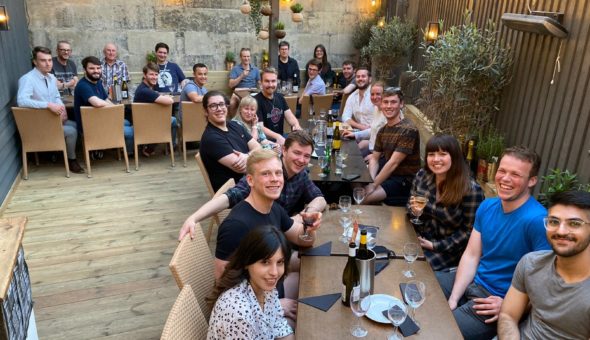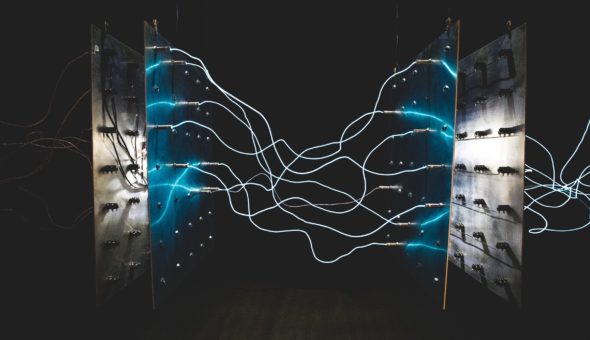During the Covid-19 pandemic many of us have had to adapt to an entirely new way of life and work. I have found that this transformation has been easier thanks to being part of a wonderful cohort and having an attentive management team that allowed us to continue with our work with ease.
Cohort 1 2030 Prius Project
Our final group project as a cohort started soon after our very first ITT, little did we know at the time that we would be conducting this project in the midst of a global pandemic. The task we were given was to develop and simulate a completely new vehicle propulsion system for a 2030 vehicle, which would then have to be pitched to a ‘board of directors’ (this board was just our professors, but still just as intimidating!), as if we were a team in a real automotive company.
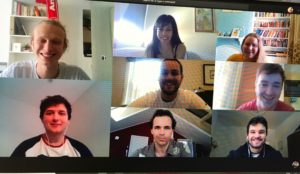 This project was a follow on from our previous course, where we critically assessed the 2015 Toyota Prius hybrid from lots of different perspectives. We didn’t just consider the implications of the powertrain on the performance of the vehicle, we also delved deeper into the consequences of using certain materials and how those materials were managed. These consequences varied from political to social and all the way to environmental, making it a real challenge for some of us who had never had to consider these before when conducting previous research. This was incredibly useful for our current project as we now had the knowledge of the decisions that were made for the Prius that were a real success and those that weren’t.
This project was a follow on from our previous course, where we critically assessed the 2015 Toyota Prius hybrid from lots of different perspectives. We didn’t just consider the implications of the powertrain on the performance of the vehicle, we also delved deeper into the consequences of using certain materials and how those materials were managed. These consequences varied from political to social and all the way to environmental, making it a real challenge for some of us who had never had to consider these before when conducting previous research. This was incredibly useful for our current project as we now had the knowledge of the decisions that were made for the Prius that were a real success and those that weren’t.
Wireless Teamwork
During the final weeks of February and the first two weeks of March, the University remained open, which allowed us as a team to work together in the same room as we prepared to work on our new vehicle design and business proposal. Together we worked on exactly what we wanted our vehicle to do, doing market and customer research to find out what meant to the most to people and how we could deliver those through the propulsion system. Somewhat we had made a risk assessment for our project and thought through what we would do in the case of a global pandemic, as we were conscious that there was a very high risk that this would affect us for the rest of this project. This was extremely helpful when the University (and Britain) closed and everyone isolated inside their homes, as we already had a plan to able to work online through Microsoft Teams if this was to occur! This was initially challenging due to not being able to interact in the same way that we usually would, and, most of the work took much longer than it would usually take. But we soon found our groove and learnt how to work together, remotely, all on a single document as well as developing our simulation of this new powertrain harmoniously! In order to maintain some familiarity, our management team set up a daily ‘Morning Coffee’ session on Teams where we could all chat and catch up, just like we would when working in the office!
Poster Presentation
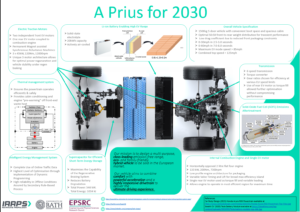 The final week of the project was very hectic compared to the other weeks, where we were just working on our project, as we had multiple deadlines in that week. We each had to complete individual reports on our part of the simulation, we also had to deliver our business proposition over a 2 hour session with our professors where we gave a 45 minute presentation on the
The final week of the project was very hectic compared to the other weeks, where we were just working on our project, as we had multiple deadlines in that week. We each had to complete individual reports on our part of the simulation, we also had to deliver our business proposition over a 2 hour session with our professors where we gave a 45 minute presentation on the 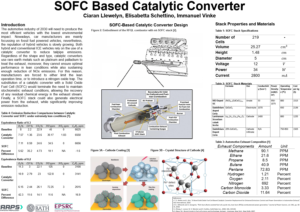 various aspects of our vehicle (not just the how it worked but the environmental and social costs) and finally we had a poster presentation exhibition. This poster exhibition was meant to be part of the mechanical engineering department’s Annual Design Exhibition where researchers from the University and various industries come to showcase their current work.
various aspects of our vehicle (not just the how it worked but the environmental and social costs) and finally we had a poster presentation exhibition. This poster exhibition was meant to be part of the mechanical engineering department’s Annual Design Exhibition where researchers from the University and various industries come to showcase their current work. 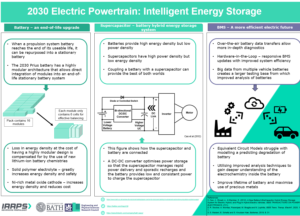 This would have been a great opportunity for us to, not only show what work we have been doing, but also to gain more interest in the AAPS CDT but it was unfortunately cancelled. Nevertheless, this did not stop us from delivering on our objective to create three posters that would have been shown to academics! We held a mini virtual exhibition where academics from the department came to look at our posters and ask us questions involving our work, which lasted roughly 45 minutes. This was a great example of how the team has learnt to be flexible to make sure that we could overcome challenges in our way!
This would have been a great opportunity for us to, not only show what work we have been doing, but also to gain more interest in the AAPS CDT but it was unfortunately cancelled. Nevertheless, this did not stop us from delivering on our objective to create three posters that would have been shown to academics! We held a mini virtual exhibition where academics from the department came to look at our posters and ask us questions involving our work, which lasted roughly 45 minutes. This was a great example of how the team has learnt to be flexible to make sure that we could overcome challenges in our way!
ITT Preparation
Despite these extenuating circumstances, the management team at AAPS were able to organise a virtual ITT for the week beginning 1st of June with Horiba Mira. During this week, the cohort will be working alongside other researchers and academics to tackle three challenges that face the automotive industry: energy management of connected vehicles; incorporating driver aggressivity into Real Driving Emissions testing; and proving carbon neutrality. In order for the cohort to best prepare for this weeklong event, we have organised a weekly session called ‘Journal Club’ (however we cannot take credit for the idea as we stole it from the SAMBa CDT!). For Journal Club, we take it in turns to read a research paper relating to one of the three topics and present the findings to the rest of the cohort. This has been a great idea, especially during the lockdown as it is a great way to disconnect from our project and focus on something else, this can be a bit of a needed break. It is also a great time for the group to chat about the problems and learn more from each other, given our transdisciplinary backgrounds!
Academic Conference (Battery 2030+)
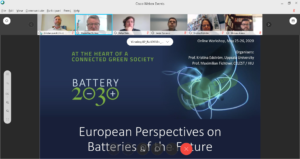 Outside of University related work, the Coronavirus has also led to opportunities that we normally wouldn’t have had. An example of this is the Battery 2030+ conference held on the 25th and 26th of May, which was a set on researchers giving presentations of cutting-edge chemistry research going on in the field of batteries from all over Europe to over 700 people. These types of conferences are sometimes inaccessible due to being in other countries and expensive to attend. However, this event had to be moved online, which meant that it was completely free, and I could
Outside of University related work, the Coronavirus has also led to opportunities that we normally wouldn’t have had. An example of this is the Battery 2030+ conference held on the 25th and 26th of May, which was a set on researchers giving presentations of cutting-edge chemistry research going on in the field of batteries from all over Europe to over 700 people. These types of conferences are sometimes inaccessible due to being in other countries and expensive to attend. However, this event had to be moved online, which meant that it was completely free, and I could 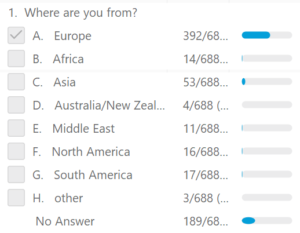 watch from the comfort of my sofa in my pyjamas (which is a chemist’s usual attire when they’re not in labs FYI)! I have not attended many conferences throughout my career, but this was a great experience and a real eye-opener to some areas of research that I had no idea was being looked into, such as using machine learning to develop new mixtures of various elements to make new and improved battery materials.
watch from the comfort of my sofa in my pyjamas (which is a chemist’s usual attire when they’re not in labs FYI)! I have not attended many conferences throughout my career, but this was a great experience and a real eye-opener to some areas of research that I had no idea was being looked into, such as using machine learning to develop new mixtures of various elements to make new and improved battery materials.
Pub Quizzes
Luckily it has not all been work related and we have been able to have multiple opportunities to socialise, in what would be outside of work. Our cohort and department held pub quizzes every other week that we all attended through a teams call, with different pub quiz hosts each time. This was great fun for me as it enabled me to return to semi normality as we could speak over a drink (or two!) like we would usually do on a Friday evening, even some of the professors would join in! The most difficult thing about these quizzes was judging how difficult the quiz would be, as when you already know the answer as the host, you think it could be really easy! However, a major rift was formed between the cohort when one of the questions was brought into contention… How many Reindeer does Santa have: 9, 10 or 12? Who knew such seemingly innocent question that could bring about such heated arguments!
Cohort 2 Welcome Day
As we approach the end of MRes year for cohort 1, the AAPS management team start preparing for the arrival of the following cohort who will be arriving in September. I use the term ‘arriving’ loosely as I am not entirely sure if it is possible to virtually arrive but nonetheless!
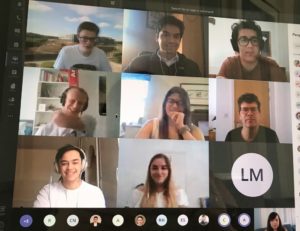 A meet and greet session was set up on teams where the new cohort would have a chance to meet with some of the academics who work on the course, the management staff as well as the cohort 1 students. This session started off with an informal chat with the everyone before we started with a way to start to get to know people. There was a ‘main room’ (a team’s channel), which everyone started out in and then 3 other ‘rooms’, which people were assigned to for the activity! The first activity we did was a personal fact bingo! Everyone who was attending had to submit a fun fact about themselves beforehand so that each person could have a bingo chart with some facts. The aim was to find out who the facts belonged to and get their names written down before anyone else.
A meet and greet session was set up on teams where the new cohort would have a chance to meet with some of the academics who work on the course, the management staff as well as the cohort 1 students. This session started off with an informal chat with the everyone before we started with a way to start to get to know people. There was a ‘main room’ (a team’s channel), which everyone started out in and then 3 other ‘rooms’, which people were assigned to for the activity! The first activity we did was a personal fact bingo! Everyone who was attending had to submit a fun fact about themselves beforehand so that each person could have a bingo chart with some facts. The aim was to find out who the facts belonged to and get their names written down before anyone else. 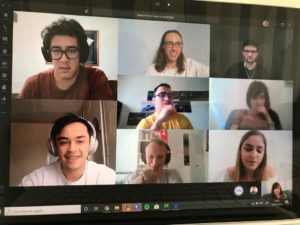 We were split up into assigned other 'rooms' to begin with and started asking questions of everyone in that 'room' to find out the what fact applied to who! We were then able to jump from 'room' to 'room' as we wished to try and find the information, however, sometimes you would just miss the person who you needed the most as they entered another 'room'. There was a lot of different tactics (and I’m sure some underhand swaps) but once you had found all the names you were to go back to the main 'room' where one of the academics was waiting to say bingo! Despite all my efforts, Alex Young beat everyone to the chase (unsurprisingly!). This was tried before in real life last year during an IAAPS away day and it worked amazingly, so this was a test to see if this activity could be brought online. It turned out to be a great success! It was a really engaging way to get to know the incoming students on a more personal level as able to have a laugh with them over an activity.
We were split up into assigned other 'rooms' to begin with and started asking questions of everyone in that 'room' to find out the what fact applied to who! We were then able to jump from 'room' to 'room' as we wished to try and find the information, however, sometimes you would just miss the person who you needed the most as they entered another 'room'. There was a lot of different tactics (and I’m sure some underhand swaps) but once you had found all the names you were to go back to the main 'room' where one of the academics was waiting to say bingo! Despite all my efforts, Alex Young beat everyone to the chase (unsurprisingly!). This was tried before in real life last year during an IAAPS away day and it worked amazingly, so this was a test to see if this activity could be brought online. It turned out to be a great success! It was a really engaging way to get to know the incoming students on a more personal level as able to have a laugh with them over an activity.
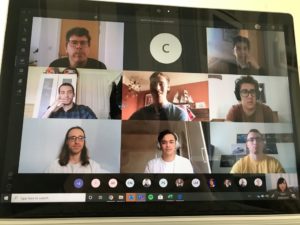 This was a great introduction and led us seamlessly into the one to one chat between cohort 1 mentors and their cohort 2 mentees. This was a chance for us to get to know the students that we will be talking to more often and offering any advice or help that we could give to them before their arrival at Bath.
This was a great introduction and led us seamlessly into the one to one chat between cohort 1 mentors and their cohort 2 mentees. This was a chance for us to get to know the students that we will be talking to more often and offering any advice or help that we could give to them before their arrival at Bath.
After 20 or so minutes, we ended the day with a final group discussion in the ‘main room’ and any final questions before… ANOTHER VIRTUAL PUB QUIZ (what else?!)! This was, of course, a great success and was the real first test for the incoming cohort, which they passed with flying colours. We can't wait to welcome them properly in September.
Overall this event has made me really excited to still be apart of this CDT despite moving onto the PhD stage of this program as I still have every opportunity to still get involved and meet new people.
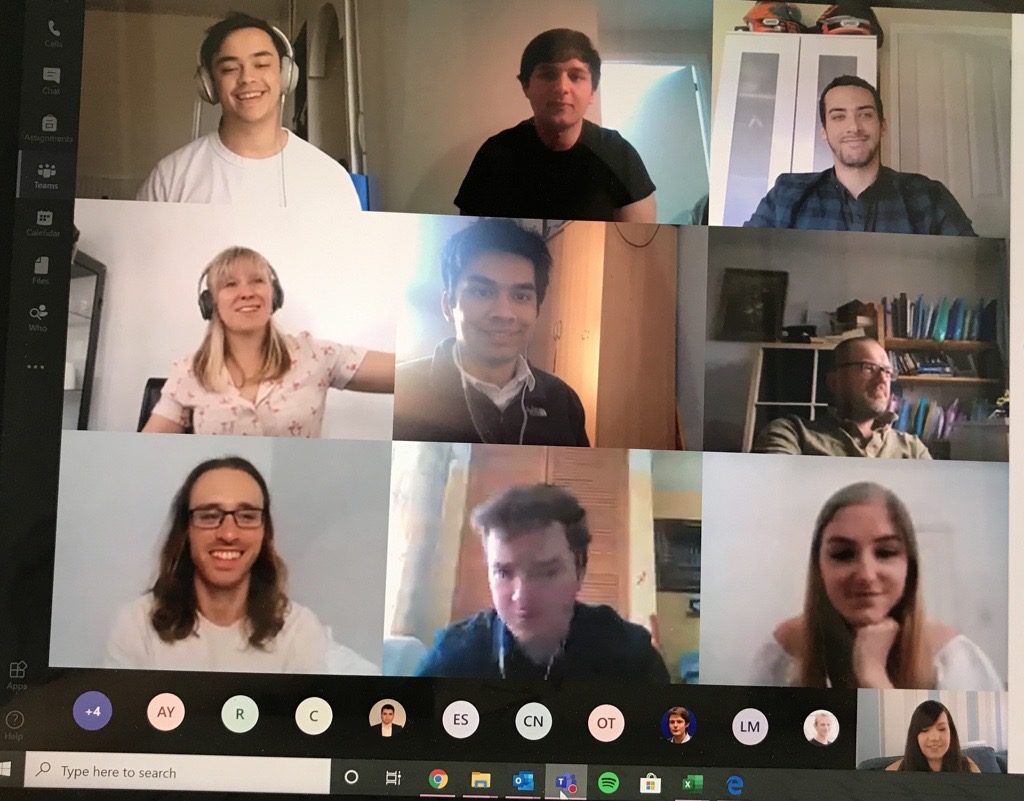
Respond

